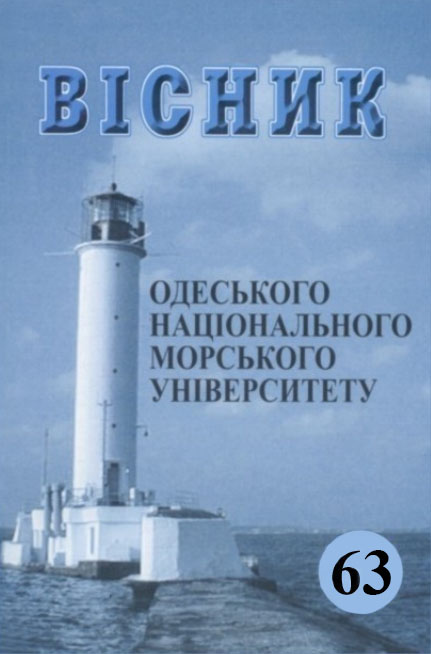Humanization of the information triads in modern technical progress
Main Article Content
Abstract
From the analysis of the development of society, it follows that the expansion of information flows puts forward new requirements for the transfer of knowledge from the previous generation to the next − to education. A contemporary of scientific and technological progress must realize his creative participation in the constantly information field, feel his connections in all phenomena in the noosphere. This requirement is resolved by the predominance of the moral development of mankind over scientific and technological progress, which is achieved by the humanization of education. The humanization of education removes the disharmony between the «technologization» of a person and the «humanization» of technology in the information society and orients the individual towards the highest goals of social development. In this plane, the role of the state as a guiding and coordinating institution in the information society is growing.
Article Details
References
2. Kak sozdavalsya «Chas Bika» (Beseda s Yvanom Efremovіm) [How the «Hour of the Bull» was created (Conversation with Ivan Efremov)] «Molodaya hvardyya», 1969, no 5, pp.307–320
3. Vernadskyy, V.Y.(1989) Nachalo y vechnost' zhyzny [The beginning and eternity of life]. Moscow, pp. 611-612 (in Russian).
4. Ynformatsyonnse tekhnolohyy: ponyatyynaya y strukturnaya kharakterystyka [Information technology: conceptual and structural characteristics]Available at https://sites.google.com/site/ infotrmattehnologi/nalastuvanna (accessed 16 February 2019).
5. Vityuk, N.V., Vityuk, A.N., Mashin, V.N. Ot Homo Sapiens cherez Homo Interneticus k Homo Sapientissimus (Ot Cheloveka Razumnoho cherez Cheloveka Ynternet•stvuyushcheho k Cheloveku Razumneyshemu [From Homo Sapiens through Homo Interneticus to Homo Sapientissimus (From Homo sapiens through Homo sapiens to Homo sapiens)]. Proceedings of the VI mezhdunarodnaya nauchno-praktycheskaya konferentsyya «Ynformatsyonnie kontrol'nie systemi y tekhnolohyy» (Ukraine, Odessa, September 23-25, 2017), Odessa: ОНМУ, pp. 85-86
6. Fomyn, Y.N. Vlyyanye ynformatsyy na uskorenye razvytyya obshchestva [The influence of information on the acceleration of the development of society] Available at https://cyberleninka.ru/ article/n/vliyanie-informatsii-na-uskorenie-razvitiya-obschestva/ viewer (accessed 16 February 2019)
7. Demyanova, E.G., Kolesnik, A.A. (2014) Ynformatsyonnaya zavysymost' kak psykholoho-pedahohycheskaya problema [Information dependence as a psychological and pedagogical problem]. Kherson: Young scientist, no.4, pp. 943-945
8. Kamedyna, L.V. (2014) Byblyya. Knyha knyh v Dukhovnoy kul'ture chelovechestva [Book of Books in the Spiritual Culture of Humanity]. Berlin (in Russian).
9. Mangel, A. (2008) Ystoryya chtenyya [Reading history] Ekaterynburh (in Russian).
10. «Mars atakuet!» − volshebnaya syla yskusstva [«Mars Attacks!» − the magic power of art] Available at http://znayka. blogspot. com/2017/10/ (accessed 16 February 2019)
11. David Kogan in foreword to the book: Hand R.J. Terror on the Air! Horror Radio in America, 1931-1952. McFarland&Co, Unc., Publishers Jefferson, North Carolina, London, 2006. Available at https://books.google.fm/books?id=kzqPM UhN10C& printsec=frontcover&source=gbs_book_other_versions_r&cad= 4#v= onepage&q&f=false (accessed 16 February 2019)
12. Bard, A., Zoderkvyst, Ya. (2004). Netokratyya. Novaya pravyashchaya elyta y zhyzn' posle kapytalyzma [Soderquist I. Netocracy. The new ruling elite and life after capitalism]. St. Petersburg: Stok•hol'mskaya shkola эkonomyky v Sankt-Peterburhe. (in Russian)
13. Kastel's, M. (2000) Ynformatsyonnaya epokha: ekonomyka, obshchestvo y kul'tura [The Information Age: Economics, Society and Culture]. Moscow: HU VShe. (in Russian).
14. Vityuk, N.V, Mashin, V.N. (2019) Economic aspects of interaction of individual and society in informative society. Herald of the Odessa National maritime university, vol №3, no 60, pp.156-170.
15. Huzayrov, M.B., Yl'yasov, B.H., Herasymova, Y.B. (2007) Systemniy podkhod k analyzu slozhnikh system y protsessov na osnove tryad [A systematic approach to the analysis of complex systems and processes based on triads]. Problemi upravlenyya, no5, pp.32-38.
16. Neofobyya − boyazn' peremen. Kak preodolet' strakh. [Neophobia − fear of change. How to overcome fear.] Available at https://racurs.ua/2214-neofobiya-boyazn-peremen-kak-preodoletstrah.html (accessed 23 April 2019)
17. Myller, T.A. Antychnie teoryy epystolyarnoho zhanra. [Ancient theories of the epistolary genre] Available at http://www.sno.pro1. ru/lib/antichnaya_epistolographiya/2.htm (accessed 23 April 2019)
18. Pysat' – znachyt – dumat'. Kak pys'mo ot ruky vlyyaet na rabotu mozha. [To write is to think. How handwriting affects the brain.] Available at https://xochu-vse-znat.ru/interesnoe/pisat-znachitdumat-kak-pismo-ot-ruki-vliyaet-na-rabotu-mozga.html (accessed 23 April 2019)
19. Madonni Rafaelya [Madonna Raphael] Available at http://topantropos.com/religion/hristianstvo/item/134-madonny-rafajelja (accessed 23 April 2019)
20. Rabynovych, M. (2018) Neotkrыtie otkrityya yly kto eto prydumal?[Undiscovered discoveries or who invented it] Khar'kov (in Russian).
21. O konservatyzme y novatorstve v nauke y tekhnyke (nekotorie tsytati) [On conservatism and innovation in science and technology (some quotes)] Available at http://www.spacephys.ru/o-konservatizme-i-novatorstve-v-nauke-i-tekhnike-nekotorye-tsitaty (accessed 23 April 2019)
22. Holoborod'ko, V., Yanushevych, Y., (2017). Yskusstvenniy yntellekt – nachalo novoy эpokhy yly konets chelovechestva. [Artificial intelligence − the beginning of a new era or the end of humanity] Filosofiya ta humanism ONPU, vol.2(6), no. 37, pp.37-46.
23. Chto takoe umniy dom [What is a smart home] Available at https://www.smarthouse.ua/umnyj_dom.html (accessed 23 April 2019)
24. Dolhykh E.Y., Antonov E.V., Borushkyna S.M. (2015) Smart cities: podkhodы y tekhnolohyy. [Smart cities: approaches and technologies.]. Urbanystyka y rinok nedvyzhymosty, vol.1, pp.42-49.
25. Data Age 2025. Available at URL: https://www.seagate.com/ files/www-content/our-story/trends/files/idc-seagate-dataagewhitepaper.pdf (accessed 23 April 2019)
26. Vsya statystyka ynterneta na 2020 hod - tsyfri y trendi v myre. [All internet statistics for 2020 − numbers and trends in the world] Available at https://www.web-canape.ru/business/internet-2020- globalnaya-statistika-i-trendy/(accessed 23 April 2019)
27. Tsyfrovoy autyzm. Lektsyya Andreya Kurpatova [Digital Autism. Lecture by Andrey Kurpatov] Available at https://strana.ua/news/ 249203-tsifrovoj-autizm-lektsija-andreja-kurpatova.html (accessed 23 April 2019)
28. Holub, O. Informatsiyna bulimiya: yak zmi mozhut' provokuvaty paniku. [Information bulimia: how media can provoke panic] Available at https://imi.org.ua/monitorings/informatsijna-bulimiya -yak-zmi-mozhut-provokuvaty-paniku-i32047 (accessed 23 April 2019)
29. Starenye [Aging] Available at https://www.un.org/ru/sections/ issues-depth/ageing/index.html (accessed 23 April 2019)
30. Zanovo rodylsya: pochemu vynyl snova na pyke populyarnosty? [Reborn: why is vinyl at its peak again?] Available at https://7days.ru/lifestyle/home/zanovo-rodilsya-pochemu-vinilsnova-na-pike-populyarnosti.htm (accessed 23 April 2019)
31. Kommoner Barry. (1974) Zamikayushchyysya kruh [Closing circle]. Moscow: Hydrometeoyzdat (in Russian)
32. Zakharchenko, N.V., Horokhov, S.M., Kochetkov, A.V. (2018) Informatsyonnіe parametrі pozytsyonnіkh y taymernіkh kodov. [Information parameters of position and timer codes] Odessa: Odessa National O.S. Popov Academy of Telecommunications. (in Russian)
